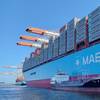A fishing ship that sank last week and is leaking diesel fuel has caused the biggest spill in Alaska's Prince William Sound since the 1989 Exxon Valdez disaster, posing a threat to the area's wildlife, state environmental officials said.
The Seattle-based Windy Bay was loaded with about 35,000 gallons (133,000 liters) of diesel fuel when it struck a rock and sank on Saturday in the northern part of the sound about 40 miles (65 km) southwest of the port of Valdez.
The spill was tiny compared with the 11 million gallons (40 million liters) of crude oil dumped by the Exxon Valdez when it ran aground on a reef outside Valdez in 1989, polluting miles (km) of coastline.
The Windy Bay sank in 1,000 feet (300 m) of water, and was carrying some lube oil and gasoline as well, the Alaska Department of Environmental Conservation said.
The five crew members aboard the Windy Bay were rescued by another fishing vessel at the time of the sinking, said Coast Guard Lt. Virginia Kammer.
Diesel fuel leaking from the ship had created a sheen covering 4 square miles (10 sq km), the DEC said. Just how much leaked was unknown, but cleanup crews had recovered about 9,700 gallons (36,800 liters) as of Monday morning, the DEC said.
A variety of seabirds and other wildlife, including bald eagles, sea otters, sea lions and humpback whales, used the area and were considered at risk of contacting the fuel, officials said.
"There have been wildlife sighted transiting through the sheen in the spill zone," said Leslie Pearson, the DEC's coordinator at the scene.
A delegation from the International Bird Rescue and Research Center was on the way to survey damage and aid ailing birds if necessary, Pearson said. It would take time to evaluate any such problems, she said.
"With a release of this size and the amount of wildlife in the area, I would expect some (impacts)," she said. "Typically in spills, you may not see any wildlife impacts initially, but it may take two or three days before it affects them."
The cleanup, which is using booms and skimmers, has been going well, Pearson said.
Sensitive areas, including two oyster farms, had been sealed off by protective booms, the DEC said.
The cleanup is being conducted by a private company hired by the Windy Bay's owner and by emergency teams contracted by Alyeska Pipeline Service Co., the operator of the trans-Alaska pipeline.
The Windy Bay is owned by Arctic Ventures Inc. of Seattle.
A decision about what to do with the 166-foot (50-m) Windy Bay was still pending, the Coast Guard's Kammer said.
"I don't think there's any plan on recovering the vessel at that depth. But final determination has not been made yet," she said. The ship's owner was considering sending a remote-controlled vessel to evaluate the damage and the possibility for salvage, she said. - (Reuters)
Featured videos

Inmarsat Enhances Service to Drive Digitalization

Unlock Onboard Data Efficiencies

Tracking Foreign Vessels Working in the U.S. Jones Act Market
Subscribe for
Maritime Reporter E-News
Maritime Reporter E-News is the maritime industry's largest circulation and most authoritative ENews Service, delivered to your Email five times per week









